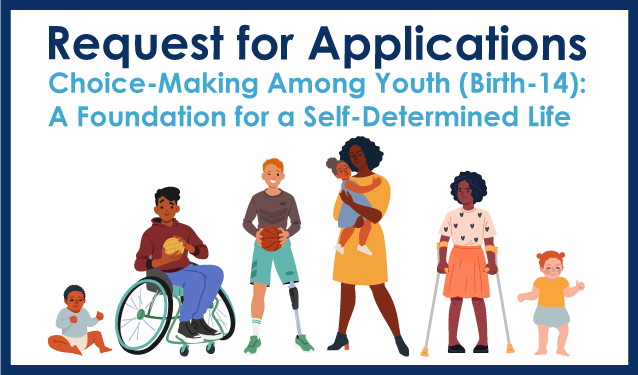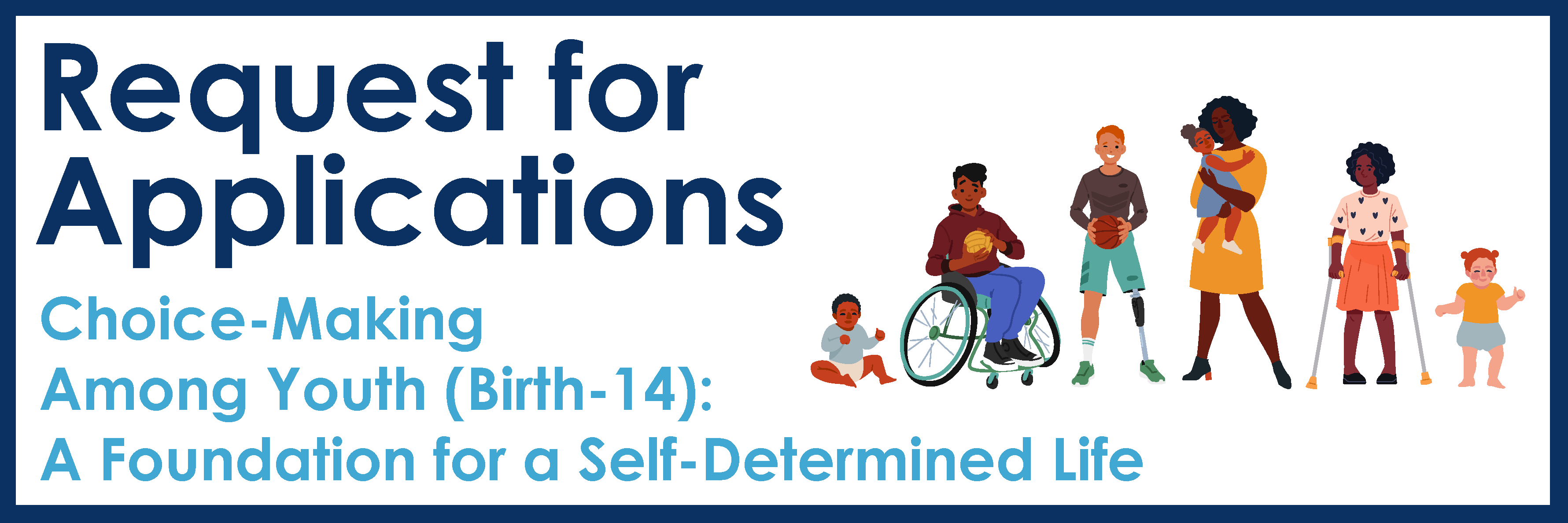

Due to technical issues with our application system, we have extended the submission deadline for this RFA to 11:59 p.m. Central time (CT) on Wednesday Aug. 28. If you have had any technical issues with submitting an application, please send us a detailed description by email to apply@tcdd.texas.gov. Include your unique application code in the email and our systems technician will work with you to resolve the issue. If you have already successfully submitted your application, then it is in our system and you do not need to take any action.
TCDD has issued a Request for Applications (RFA) for a new grant project that will increase choice-making skills among children with developmental disabilities (DD), from birth to age 14, and among their parents and caregivers.
Choice-making empowers children with DD by fostering a sense of responsibility and autonomy, enhancing children’s communication abilities, and contributing to overall community safety through reducing abuse and neglect. By promoting choice-making in children at younger ages, they will be in a better position to make self-determined choices as adults.
TCDD has approved funding of up to $300,000 per year for one organization for up to five years. Applications for this RFA are due by 11:59 p.m. CT on Wednesday, Aug. 28. Applications submitted on time may be reviewed at the November 2024 Council meeting. Review dates are subject to change. Late applications will not be accepted.
Please send questions about this RFA to apply@tcdd.texas.gov by Friday, Aug. 16. TCDD will post answers to questions on this webpage on a regular basis until Wednesday, Aug 21.
Answer: Individuals cannot apply for a grant or stipend. Please see our How to Apply page for information on organizations that may apply.
Answer: TCDD funding can only reimburse up to 10% of the federal funds requested for IDC. For those grantees who have a negotiated federal IDC rate, a copy must be provided to TCDD, and the grantee can utilize and claim match for the remaining percentage of the IDC rate.
Answer: Since the grantee applying for funding is subcontracting with a statewide agency, the statewide agency can then subcontract with the regional nonprofits.
Answer: You may outline the next years for the project, but only focus on Year 1 in detail.
Answer: Please email us at apply@tcdd.texas.gov, and our systems technician will work with you to resolve the issue.
Today, more than 7 million children with disabilities receive specialized education and related services tailored to their needs. This is thanks to the Individuals with Disabilities Education Act (IDEA) of 1990, which was originally named the Education for All Handicapped Children Act of 1975. During the 2022-23 academic year, 66% of children with disabilities were integrated into general education classrooms for 80% or more of their school day. Early intervention services were also extended to more than 441,000 infants and toddlers with disabilities and their families.
While the law requires that children receiving special education services must have a transition plan by age 14, there is growing recognition that children should learn at a much earlier age the skills needed to effectively engage in this planning process in order to make their own decisions about work, school, and life after high school. TCDD invests in building skills and empowering young adults with DD to better say what they want and need in order to live self-determined lives. Through self-advocacy, people with DD can have greater impact on their own situations, on the public policies that affect them, and on the supports and services they receive.
Among the skills involved in becoming self-determined, choice-making is one of the first and most basic skills to develop and build upon. Choice-making is the “selection of an item or activity from an array of options at a particular moment in time.” Mastering choice-making skills requires development and consistent practice. People with DD too often have limited experience making choices.
At all ages, children can make choices each day on what to eat, how to dress, when to play, and how they interact with others. Granting children the autonomy to make choices, even if those choices include the possibility of errors, may appear risky to parents. Yet research shows that more practice with choice-making skills serves to improve quality of life. Children who are given more choice-making in play activities have more positive behavior outcomes.
More broadly, choice-making serves to empower children with disabilities by fostering a sense of responsibility and autonomy, enhancing children’s communication abilities, and contributing to overall community safety through reducing abuse and neglect. By promoting choice-making in children at younger ages, they will be in a better position to make self-determined choices as adults.
Several state councils on DD have developed programs and resources to support choice-making among youth. Here are two examples:
TCDD will fund a project to better prepare youth with DD, from birth to age 14, to lead self-determined lives using a range of strategies and tools to enhance choice-making skills. The selection of this age group is intended to supplement the education and training already available to youth older than 14.
The project will develop and demonstrate innovative models for children with DD, families, educators, and support providers that can be replicated to promote opportunities for self-advocates to better say what they want and need. The project should compile evidence-based practices for building choice-making skills among children at all developmental levels. This may include a review of existing literature and programs as well as the collection of new data through conversations with children with DD, their parents, educators, and providers.
The grantee awarded funding for this project should incorporate methods for children and families to practice choice-making skills. The grantee must also consider the full range of communication abilities. Youth with limited language or significant disabilities can make choices by letting others know their needs and preferences in their own ways. To this end, the grantee should consider the following questions:
During the project, the grantee will complete the following tasks:
The grantee awarded funding must have a plan for sharing any training curricula or other materials when the project ends. The grantee may consider developing at least one self-paced learning module or resource that allows users to access to the learning content at any time. The grantee may use TCDD’s learning-management system, Oasis, as needed.
Project materials must be translated into Spanish and other appropriate languages based on the community in which they delivered. All training curricula and other project materials must be reviewed and approved by TCDD before they are used.
When applying for this RFA, you must provide the following information:
The project must focus on improving choice-making among youth with DD from birth to 14 of all abilities and communication styles. Increasing choice-making opportunities for youth with DD at these ages also involves support from parents, family members, and others. The project should include strategies to involve a child’s parents and others in their support network, including early childhood providers and educators.
The grantee for this project should identify and report specific strategies to recruit and include individuals with DD from diverse racial, gender, and cultural groups in Texas.
The grantee may choose to initiate the project with specific age and cultural groups or may choose representative sites in select areas of the state and expand capacity and participation throughout the grant.
The project must collect participant data to provide TCDD with the following information, at minimum:
Applicants for this RFA must include a detailed evaluation plan for tracking skills, knowledge gains, and choice-making practices over time. The project must develop pre-training and post-training evaluation methods to identify knowledge and skills gained as a result of the training. These methods can include the following examples:
The project should collect contact information and follow up with training participants to report on their choice-making activities after participation in the training.
The grantee awarded funding for this project will collect data and measure outcomes for all project participants. The grantee must collect participant data in four categories:
For each of these categories, the collected data must include:
TCDD has approved funding of up to $300,000 per year for one organization for up to five years. Funding is provided to TCDD by the U.S. Administration for Community Living, Department of Health and Human Services, per the Developmental Disabilities Assistance and Bill of Rights Act. For projects conducting work in federally designated poverty areas (PDF, 6 pages, 935 KB), non-federal matching funds of at least 10% of total project costs are required. For projects conducting work in non-poverty areas, non-federal matching funds of at least 25% of total project costs are required.
Due to technical issues with our application system, we have extended the submission deadline for this RFA to 11:59 p.m. CT on Wednesday Aug. 28. If you have had any technical issues with submitting an application, please send us a detailed description by email to apply@tcdd.texas.gov, and our systems technician will work with you to resolve the issue. If you have already successfully submitted your application, then it is in our system and you do not need to take any action.
To apply for this RFA, please email apply@tcdd.texas.gov to request an application. Please indicate which RFA you are requesting an application for. After we receive your request, we’ll email you an online application.
Before applying, you should review our How to Apply webpage for further application instructions and requirements.